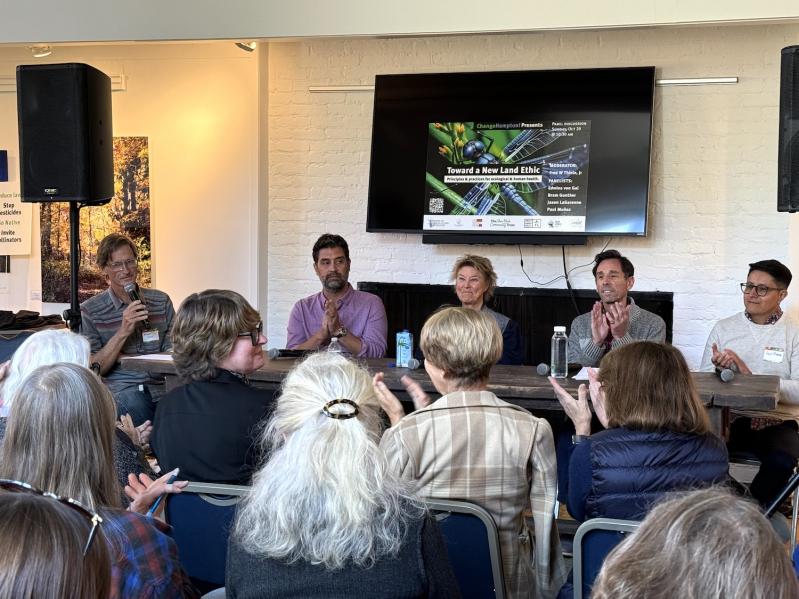Imagine if two and a half billion people, about 30 percent of the world’s population, had been lost since 1970.
If that were true, it would be alarming. That’s the situation for birds. Three billion, or nearly 30 percent, have disappeared, largely because of habitat loss in just the last 50 years. And part of that is happening right here on the East End, with the proliferation of manicured properties dependent on noisy landscaping equipment.
“We were being driven mad and were fiercely angry about leaf blowers,” Gail Pellett, a co-founder of ChangeHampton, said about the origin of the group when speaking to a crowd of about 100 people at an Oct. 20 discussion called “Toward a New Land Ethic.”
“What is a new land ethic?” Stephan Van Dam, the president of ChangeHampton, asked rhetorically. The idea, he said, is “to disrupt our relationship with the natural world and overcome and change our attitude towards nature — the idea that we need to dominate nature. We need to disrupt that.”
Biddle Duke of Springs, filling in for Assemblyman Fred W. Thiele Jr., who was ill, moderated a panel of landscapers, policy makers, and landscape designers with the goal of discussing ways to move toward a healthier, more sustainable relationship with our home landscapes.
Paul Munoz, a panelist who owns Eco Harmony Landscapes, and is dedicated to quiet and organic landscaping practices, said he started the company to empower homeowners and to prove “there is an alternative, and inspire other landscapers.” His company uses only electric equipment, blowers, and mowers. Mr. Duke asked him about the logistics. “My machines charge overnight on a trailer. They last the whole day.” While the equipment cost him 30 to 40 percent more up front, he said it only took him two and a half years to make back his investment.
While gas-powered equipment is loud, polluting, and outdated according to any metric, it’s not our biggest problem. When Mr. Duke asked the panelists what the most injurious landscaping practice is, Edwina von Gal, founder of the Perfect Earth Project and a landscape designer, quickly answered, “Tick spraying. There is no such thing as a tick-specific spray and we’re living through a massive collapse of biodiversity.”
“What are the better ways to deal with ticks?” asked Mr. Duke.
“Spray yourself and check yourselves,” she said. A five-year study by the Cary Institute of Ecosystem Studies and the Centers for Disease Control showed no reduction in the incidence of tick-borne diseases on properties that were sprayed, she said. “When people spray, they lose their vigilance. Try to resist the incredible marketing that is being pushed on you by noise and poison. Just don’t buy it.”
Bram Gunther, who was the chief of forestry and natural resources for New York City and is now a co-partner in Plan It Wild, a landscape design company, said suburban metropolitan areas had been ignored by earlier conservation movements. “We are in the third wave of American conservation,” he said. The first wave was the protection of great, wild lands, the second was creating green spaces in the confines of big, dense cities. “Now we are here at that table trying to fill that gap.” The most effective message to convince people to change their landscaping practices, he said, is to relate it to their personal and familial health. He raised the concept of “the noble lawn.” A biodiverse lawn free of chemicals. The opposite of sod.
“There are kids in organic pajamas, but their lawns are glowing at night,” echoed c. “The first thing to do is reduce lawn. It doesn’t have to cost more.”
“Everyone has a spot that they can convert into a pocket meadow,” agreed Mr. Munoz. “I’m not saying get rid of your entire lawn, but it starts with a question: ‘How much do I really need?’ If you’re honest with yourself, not as much as you have.”
How do you change your landscaper’s mind, however? “Ask them if they’d like to distinguish themselves from the rest,” said Mr. Munoz. Going electric, he said, was an effective marketing tool. In the absence of companies willingly changing their practices, could legislation help? A year-round leaf-blower ban has been discussed, but never implemented. When raised in the past, the idea got pushback from conventional landscapers.
Mr. LaGarenne was unperturbed. “There were nice bar owners who said they would have to go out of business with the smoking ban when it went into effect,” he said, making the point that businesses will adapt. “We’ve got to get these properties off the sauce.”
How about changing neighbor behavior? “People are obsessed with their gardens being neat, the same as the inside of their house,” said one audience member. “It can’t be you out there pointing your finger at them. It just doesn’t work,” said Ms. von Gal. “Focus on their personal and pet health. It should be the voice of an expert.”
“Peer pressure is huge,” she acknowledged. “The key is to make it beautiful. It’s up to us designers to design gardens that are resilient and that don’t require blowing.” As for the proliferation of thoughtless giant hedges that have no environmental benefit? She said one of the most important things a homeowner can do for the birds is to introduce thickets to their property. “Biodiverse, dense, native shrubs that are not pruned.”
Mr. LaGarenne believes the aesthetic tide has been shifting. “People come out here for the natural beauty. To come, mow it down, and then sod it makes no sense.”




